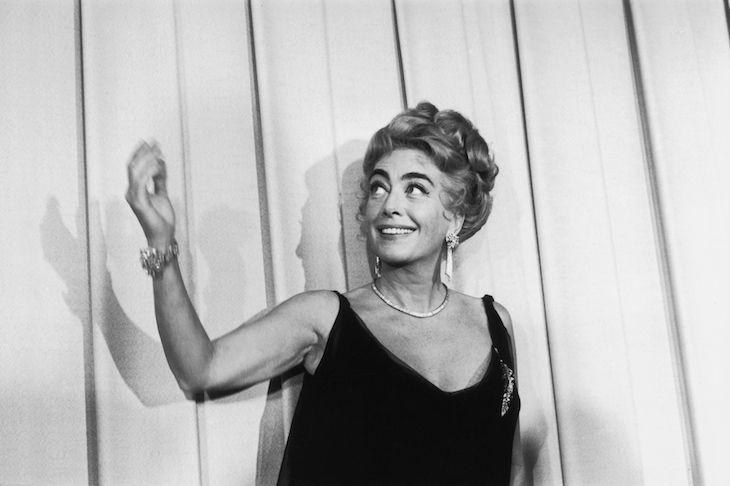‘On air, I could be the most glamorous, gorgeous, tall, black-haired female… Whatever I wanted to be, I could be… That was the thrilling part to me,’ said Lurene Tuttle, talking about her career as a star of American radio in its heyday from the 1930s to the 1950s. She was known as ‘the Woman of a Thousand Voices’ because of her talent for voicing any part, from child to OAP, glamour puss to gangster moll, hard-nosed executive to soft-hearted minion. On Saturday we heard her in full flow on Radio 4 Extra in an episode of Suspense, brought out of the archive from June 1949 for the three-hour special celebrating The Golden Age of American Radio. It was terrifying.
Tuttle starred opposite Joan Crawford, who was so nervous about being on radio she insisted the episode was prerecorded (the episodes usually went out live, with a full orchestra in the studio providing a dramatic musical backdrop). On this occasion Crawford was the good sister Clara, against Tuttle’s jealous, crazed Adele. As the two screeched at each other, the lamps flickered, I swear, and my pulse rate soared. The best thing I’ve heard for a while — in spite of its completely over-the-top plot, with Clara’s husband killed with a knitting needle and her son murdered in a beach hut. Tuttle and Crawford were so convincing, so in character, not just reading or voicing the script, I felt as if I was watching it unfold on the big screen, in black-and-white, a tussle between two Hollywood goddesses.
They had money for radio in those days, the big brands sponsoring long-running shows, such as the Lux Radio Theater, when Hollywood stars reprised their film roles in adaptations that were broadcast live, with an interval, just like in the cinema. We heard Marilyn Monroe being interviewed in an intermission, stumbling over her words, giggling nervously, and dropping in a plug for the sponsor (Lux soap flakes).
‘Lux helps a lot,’ says her interviewer, clumsily introducing the subject of doing the washing.
‘That’s right, Mr Kennedy,’ says Monroe. ‘It’s my standby.’
‘Thousands of girls have been telling us for years how lovely the lingerie stays with Lux care?’
‘Any girl would prefer pretty undies than faded ones,’ Monroe simpers through what sounds suspiciously like gritted teeth.
Lucy Catherine’s two-part play for Radio 4 this week was in the style of these over-the-top fictions but was actually based on a fantastical but real-life story set in Korea, both South and North. In 1978 the South Korean film director Shin Sang-Ok disappeared while in Hong Kong and a few years later turned up in Pyongyang, along with his actress wife Choi Eun-Hee, making films again, but now for the future leader of North Korea, Kim Jong-Il, who wanted to create a film industry that would rival Hollywood and put his country on the world stage (using very different tactics from his son, the present leader, to create a global stir).
In Lights, Camera, Kidnap! (atmospherically directed by Sasha Yevtushenko), Paul Courtney Hyu played Shin and Liz Sutherland his wife in such a way as to make us question what happened. Were they both kidnapped? Why did it take them so long to escape (on a trip to Vienna in 1986 when they fled their room in the InterContinental Hotel to the American Embassy)? In Pyongyang, Shin was given a huge budget to make whatever he wanted, and a cast of 10,000 extras, if needed. Try doing that in the West, says Kim Jong-Il.
‘The American negro is the key figure in this country,’ said James Baldwin, the American writer, who began publishing in the 1950s and died in 1987. ‘And if you don’t face him you will never face anything.’ He was unflinching in his portrayal of the country he experienced as a black homosexual, growing up in Harlem with a preacher stepfather and eight siblings. In Nobody Knows My Name: Notes on James Baldwin (produced by Shanida Scotland and Eleanor McDowall for Radio 3 on Sunday) we heard archive recordings of him talking not so much about what it was like to be born black in a country where all the standards, all the images, all the references revolve around what it is to be white and Protestant and puritan. What Baldwin wanted to do was to confront the truth, not flinch from what he was, or allow others to pretend who they were. He refused, absolutely, to remain bitter, after experiencing, as a teenager, a moment of blinding, murderous rage when he had tried to eat in a restaurant reserved only for white people. ‘I realised I could die, or I could take it all and change it.’
Writing novels, essays, plays helped him to release some of what he felt but, as these recordings showed, what he said when interviewed was equally powerful and expressed with such fluency, cogency and courage. ‘In order to learn your name,’ he insisted, ‘you are going to have to learn mine.’ Hearing him now, 30 years after his death, was salutary. How far have we still to go? How far have we gone back?






Comments